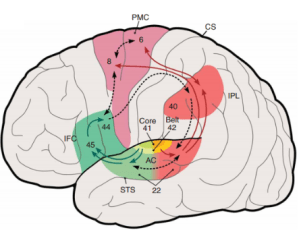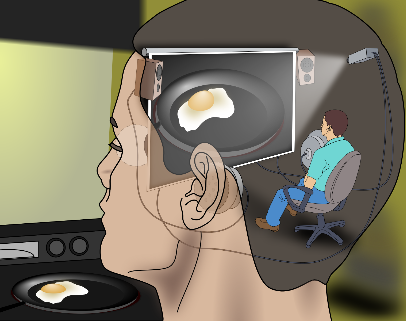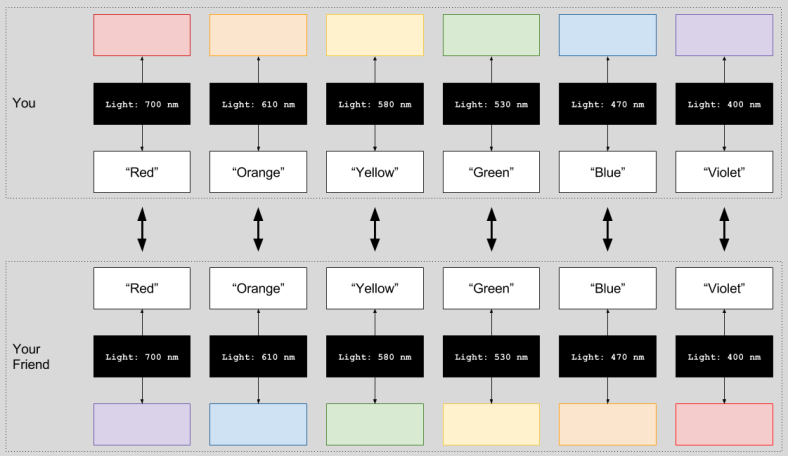Part Of: Demystifying Consciousness sequence
Content Summary: 1000 words, 10 min read
Debates about consciousness are as old as Western Civilization itself. Here, we survey 2000 years of intellectual history in 1000 words. 🙂 Wish me luck!
Movie and Subject
We begin with what consciousness is not.
- Consciousness is not mind. Consciousness is part of mind, but mind including many other algorithms which operate outside of consciousness.
- Consciousness is not conscience. Our moral circuitry does it computations elsewhere.
Let me instead put forward a metaphor. Consciousness feels like the movies. More specifically, it comprises:
- The Mental Movie. What is the content of the movie? It includes data captured by your eyes, ears, and other senses.
- The Mental Subject. Who watches the movie? Only one person, with your goals and your memories – you!
On this view, to explain consciousness one must explain the origins, mechanics, and output of both Movie and Subject.
It would be easy to get such a theory wrong. If we aren’t careful, our metaphor for consciousness might start to look like this:
But this literal interpretation (the Cartesian Theater) is nonsensical: if some person truly was watching the Mental Movie, where does its consciousness come from?
Thus, on pain of infinite regression, a theory of consciousness must ensure that the Subject is itself unconscious.
Phenomenal Consciousness
But how could scientists possibly hope to produce such a theory? After all, science is in the business of explaining publicly accessible data. But consciousness is private!
Let’s be specific. Recall your experiences of color. Every photon has a wavelength. Now, suppose you see a flashlight producing light of 700 nanometers. Two things happen:
- You experiences the distinctive color of red.
- You can truthfully report that “that light beam is red”.
Take a moment to recall how this second ability comes from. In infancy, red light presents itself frequently. The infant brain slowly consolidates these redundant sensations into a single concept RED within semantic memory. RED also contains facts about apples, strawberries, and the sunset. Later, as Word Comprehension software comes online, the word “red” (and its accompanying audio signature) are bound into RED to enable communicating with other people.
But let’s imagine your friend has some kind of strange mental disorder which “inverts” all the colors of her mental movie. The experience of red to her feels like the experience of violet to us. How would she tell us about her condition?
If you take a moment to chew on this hypothetical, a truly frightening outcome comes into view. Your friend could never learn she has a disorder. In childhood, she would acquire the exact same facts about 700 nm light, and learn the same word to denote this sense data. She would be in full agreement with her peers when they say, for example, “that apple is red”. She would pass any color test. And yet, something unsettling remains…
Concepts like RED are studied by computer scientists all the time. But, at least in our thought experiment, the experience of red feels private, even untestable.
The experience of red is known as a quale, and learning more about qualia is one of the central occupations of philosophers of mind. The subject is put most forcefully in David Chalmer’s Conscious Mind, where he coins the phrase The Hard Problem. Indeed, it is hard to see how someone could go about even beginning to construct an solution.
Let’s call this experiential view of consciousness, phenomenal consciousness.
Access Consciousness
Let me now introduce another key figure in philosophy of mind: the philosophical zombie (p-zombie). Imagine one of your friends wakes up and, while behaving exactly as they would have before. If asked, your friend would still claim to feel the same etc, but his experience would be… well, he would have NO experiences.
Now, is such a thing possible? To answer, it helps to distinguish between two kinds of possibility:
- Nomological Possibility: is X possible in our universe with our universe, our idiosyncratic particle soup?
- Metaphysical Possibility: could X be possible in some universe with some completely alien laws of physics?
If p-zombies are nomologically possible, if a pill for behavior-neutral quale removal could be synthesized, then perhaps we pay ought to give credence to solipsism (“what if I am the only conscious being in the whole world”) and substance dualism (“what if my soul just floats over my body, choosing to reflect its states by magic”).
But, while p-zombies may be metaphysically possible, they are not nomologically possible. Consciousness is an adaptation: neurons and qualia are causally interwoven, and you cannot remove consciousness without crippling an organism.
The remainder of this sequence will focus on making good on the last sentence. In the meantime, let’s give this functional interpretation of consciousness a name: access consciousness.
Retiring Armchair Philosophy
To sum up, we have identified two different views of consciousness:
- Phenomenal consciousness, which focuses on experience.
- Access consciousness, which focuses on causal signature.
While philosophical debate surrounding the former has consumed millenia, scientific research into the latter is only a few centuries old. Plainly stated, the science of consciousness has been making huge strides in recent decades, and I intend to share its results.
It is my view that conceptual analysis – armchair philosophy – can only get you so far. The empirically informed will inherit the earth. We live in the age of the neural correlates of consciousness, an age where polymaths weave together seemingly disparate theories into architectures, which tower above the speculations of their ancestors.
This sequence presents a solution to access consciousness. Its cognitive structure will provide tools for reasoning about phenomenal consciousness.Like most of my writing, its contents are not uniquely my own. In fact, this sequence’s main purpose is to sketch an emerging consensus.
Until next time.




You haven’t really solved anything, or added to the debate here.
LikeLike
True by design. 🙂 This post is meant to summarize old conversations.
The rest of this sequence will be ~90% summarizing a modern-day solution to access consciousness emerging from cognitive science, and ~10% my own contributions to this framework.
https://kevinbinz.com/2015/10/02/sequence-demystifying-consciousness/
LikeLike